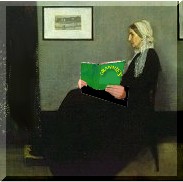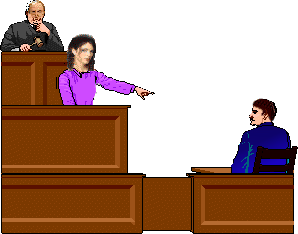GR.A.N.I.'S.

GR.A.N.I.'S. |
 |
(The GReat American Novel Invitational Society) |
|
Quick Nav Tab >> ... How To Submit ... Writers' Services ... View Catalog ... Order ... Join |
 |
The Trial
|
© 2005 by Dorothy Tennov, Ph.D.
At first, Ruth and Xavier spoke mostly about their field work, in the jungles of New Guinnea. Xavier described what he knew of the customs of the various tribes they visited. Then they talked about more general scientific matters. Xavier introduced her to Alan Browne's theory on Love Two.
But, even after borrowing and reading Xavier's copy of Browne's book, Ruth hadn't really understood that Love Two was a distinct state - universal, across cultures in its potential - but also something that not all people experienced.
"Browne," said Xavier, "and my personal experience has confirmed it, Love Two is something a person is either in or not in. You see, the course of Love Two depends on what happens. Mainly, it depends on how the person who is its object behaves, but also on whether there are obstacles to fulfillment. Adversity actually strengthens it. At least, that's what he says. If the union between Romeo and Juliet had met with family approval, they might not have been attracted to each other.
"Browne contends that once a person is caught in its grip, there are only two routes out of Love Two: Total fulfillment of desire through reciprocation, or obstacles so great that hope for fulfillment is completely and totally destroyed. The latter may never happen, because Love Two leads one to hang on to every conceivable sign of a possibility that the person will come around. That's why it can take a long time to get over it. Browne reported that it could last a lifetime under conditions with a little hope here and there."
"That must be what is meant by 'stringing someone along,'" Ruth said. "Frankly, Love Two sounds diabolical."
"You got it," Xavier answered. "Love Two gives rise to the most wonderful, most ecstatic, most entirely pleasurable experience human beings ever know. The French writer Stendhal called it 'the greatest happiness.' Browne told about an interview, taped by one of his assistants, in which a woman told such a tale of torment that it brought tears to Browne's eyes as he listened. When the interview was over, the interviewer, almost as an afterthought, asked if the woman had any final comment. She responded, 'Despite the pain, I would not have missed it for anything. It was the most wonderful thing that ever happened to me. It gave meaning to my life!' "
"No wonder psychologist Stanton Peele calls it an addiction. You make
it sound like a drug effect."
"That's right. And Browne said he had found it in all kinds of people from the very uptight to the very laid back. How they dealt with it was different, but how they felt, what they wanted, and how much their thinking was interfered with, was the same for king and commoner."
"So that's what is meant by universality. It could happen, although it
might not, but if it does happen, it happens in the same way to everyone."
"Furthermore," Xavier said excitedly, "Some of Browne's informants reported having the experience for the first time in their forties, or even later. One man said he finally understood what the words to an old songs meant. He had always assumed they were romantic exaggerations. He was astonished to learn that they were literal descriptions."
"You mean things like 'I can't get you out of my mind'."
"Precisely."
Peter Young, Ph.D., psychotherapist, was sued by a patient. Nancy Mackintosh had consulted him because she wanted to have a family, but her love relationships had always ended short of a lifetime commitment because the men would become suffocatingly over-possessive. She had liked them all as friends and as lovers, but she was unable to respond to them in some mysterious way that they said they needed her to. Dr. Young had claimed in their first session that hers was the sort of problem for which he believed his brand of psychotherapy was especially well suited. He later repeated that promise on tape, but what he promised is not what happened.
As with all heavily publicized cases, the public expressed itself on the subject.
There following statements record some of the many opinions expressed by callers
to radio shows. The trial had ended, but the publicity continued to reverberate
around the country. Few people who watched the trial of Dr. Young on TV or read
about it in the newspapers understood all that happened, why the verdict was
what it was, or how the suit had been hatched by special interests. Nor did
they understand the relevance of the trial to the revolution in human reproduction
that would take place during their lifetimes. But I get ahead of my tale.
As one who has on many occasions been the object of the irrational passions of others, I have a unique perspective on the proceedings. My opinion is that such people have succumbed to a virtually criminal level of irrationality in which they act against their own long-term interests. I could have written the movie Fatal Attraction, in which a rejected lover takes ugly revenge. I have been threatened.
Being the object of loving attentions has resulted in delightful encounters. There are problems for the weak, the empathic, or the overly moral, but if men can tolerate smothering attentions and allow their lovers to do what they want to do for them, there can be many delightful benefits. Only take care NOT to be the one who "loves." It's only being the object of passion that is useful. After all, it is a matter of their choices and their sins. The object of another's fixation can, if he or she is wise, enjoy pleasure without responsibility…But it is something I give to the woman, not something I feel. I enjoy; she, at least temporarily, is transported to a state of ecstasy that I can only wonder at. For me it's fun; it's more than that for her. The trial clarified some things I'd have preferred not be clarified.
The Young case demonstrated what I have always known:
It is that to leave the church is to do the bidding of the immoral antichrist.
It is to walk with Satan. Put a godless man in a position of power, and he will
use it to do the Devil's work. God bless.
The person I am calling about, who will be nameless, was lovesick. His wife had left him for another man. He could not stop wanting her and he could not stop believing it was possible to get her back. I could see what he was going through. It was just like in the book about Love Two that they talked about at the trial - which meant he really couldn't help how he felt. I tried to explain to them that it was not his fault and that the man was not really crazy, just obsessed in this one way. But the members of the church were outraged. They said I was contradicting the doctrine of free will and individual responsibility. That was also their attitude toward the Young Case. They said that Dr. Young chose to feel the way he did, and he chose to do what he did.
I don't believe in this Love Two nonsense. There is no such thing as not being able to control your own thoughts, at least not outside the nut house. They are just trying to excuse their indulgences. That's all I want to say.
I felt sorry for Dr. Young. There, but for the luck of the draw, could have gone anyone. Even from the biased newspaper accounts, I could see the poor man's quandary. He did nothing wrong. Nancy Mackintosh wasn't the victim; Dr. Young was the victim. He was only looking out for her interests. Certainly he was wounded by the publicity. It's not the sort of thing one wants to expose to the world, whichever way you look at it.
The human experience transcends what science can know. Science has no business messing with it. Love is sacred. It is wrong to try to tamper with love. Our humanity is under threat from these so-called scientists who carry on about Love Two.
I went right out and bought the book they were talking about at the trial. It told me that I was not alone. Maybe it is madness, but it is a normal kind of madness generally restricted to the one aspect of life. Except that it can take over other aspects. Dr. Young's vision got clouded.
Those so-called Love Two stories bore me and probably other listeners too. Psychotherapy? It's for the unbalanced. That whole case made a mountain out of a mole's hill. It's nothing. Can we please get off the Young case and get back to something important, like global warming, nuclear waste, or international terrorism?
My mother would spend long periods in what she called her "time of quiet contemplation." She would sit alone or she would lie on a couch or in her hammock lost to everything except what was going on in her mind. Mother had been dead for ten years before I understood what had been happening. Although I had read the her diary, the clippings, and the letters, I could not decode them until the Young case woke me up. I hadn't known about the emotion or the pain, and I was especially ignorant about the joy of it. For Mother, that man was the most important thing in life. He was a beacon of light and a source of exquisite pain and infinite pleasure. He gave meaning to her life, maybe a kind of meaning that others find in religion. Love Two is a powerful force. Nancy had learned to be careful, which was why she had to bring the suit against Dr. Young.
For me, "Love Two" is a phony love with no redeeming features. I've been there. She had me in her grip; she pulled my strings and pushed my buttons. But it was all beneath the surface. She was unaware. It was not deliberate on her part, and I never committed the Young error. Maybe I was too shy. It would have been too embarrassing to fail, and it was too irrational to be revealed. I guess that, as a psychotherapist, Dr. Young had more ways to rationalize the act, more bases for convincing himself that his Love Two conception of Nancy was correct, thereby overruling his professional judgment. At times I thought I was crazy, neurotic, or whatever silly thing you want to call it. But the worst of it was the wasteful inanity. Some foreign, tantalizing, but ultimately evil thing had taken possession of me. It undermined my professional life and broke up my home.
The Young case was important to me; it showed me that even though IT was crazy, I could see that I was not.
I'm tired of this story and I'm tired of these calls about Dr. Young. It's a swindle, and someone should be sued for wasting taxpayer's money. It was the stupidest and most boring soap opera I ever heard of. The man did nothing, nothing happened, and the insurance companies won big time.
The rules are simple and obvious. Ask Shakespeare. Once struck by Cupid's arrow or after downing the love potion, a person is transported to a new state of motivation. Young was playing by the rules of the wrong game.
When it was all over, Ruth was reminded of the Monica Lewinsky saga and the dress stain that changed the course of history. Whatever the end results might be, lives had been changed. That President was crippled in the one way that he might have risen above others. His sanctimonious enemies had a long field day. The ease with which they won the many plays that followed led to a scientific question that Ruth pondered seriously years later. That moment, that shameful little event, what many considered to be an ordinary indignity, meaningless in the sweep of large human events, was able to divert history.
As it happens to them, people tend to be unaware of how closely their lives depend on the actions of particular others who are in positions of power. Her husband's tiny indiscretion, in parallel manner to the blue dress incident, seemed to have brought about a similar large change; at least it was large within certain circles. Maybe it was the best thing that could have happened, and maybe Peter would go down in history as the tool of change for the better. But, even many years later, when scientific discovery had vindicated some of the participants in the drama, a faction within intelligent readership continued to condemn Peter for dishonesty. This was ironical because he was a totally honest man. Ruth could not find a definition of honesty that Peter did not fit. It was why his role as defendant was pathetic, albeit consistently dignified.
 Click here to send e-mail to GR.A.N.I.'S.
Click here to send e-mail to GR.A.N.I.'S.